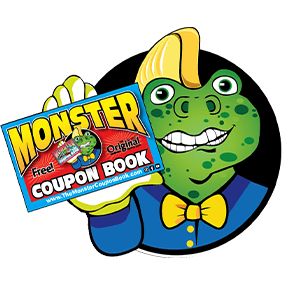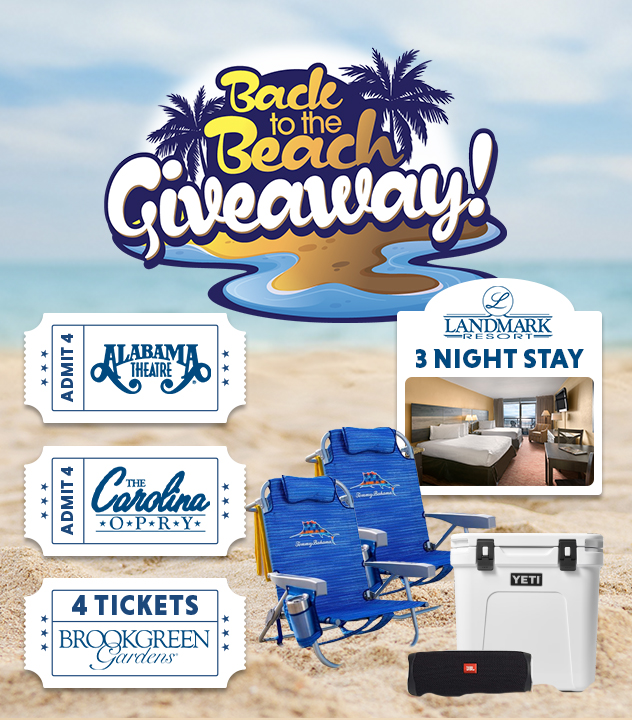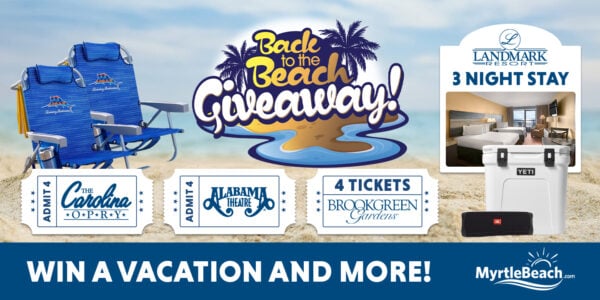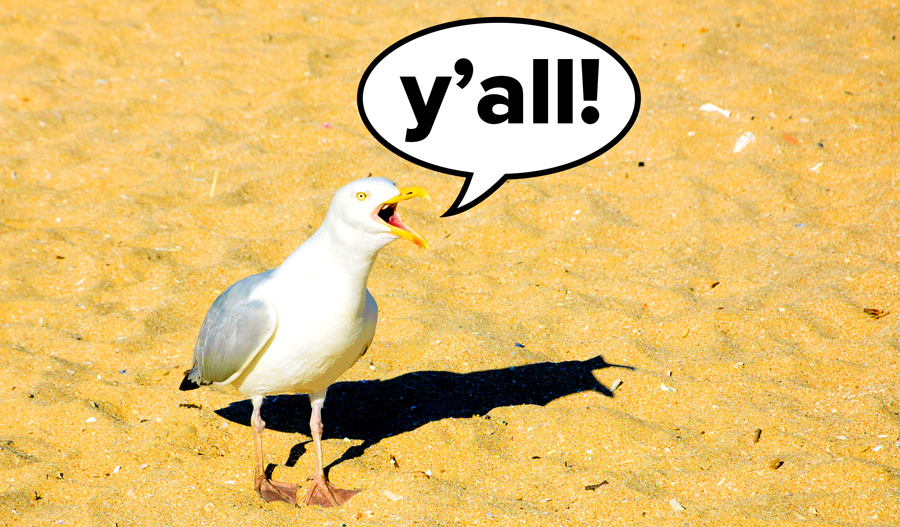
Tourism News
Myrtle Beach Sayings, Nicknames & Slang Terms You Should Know
If you don’t know Myrtle Beach nicknames and slang terms before your visit, you’re sure to be introduced to some—or many—while you’re here. Thanks to its interesting and diverse culture, this oceanfront paradise has a language all its own. Whether it is someone greeting you from afar or directing you down the Boulevard, knowing the basic terms can stop you from wandering into pluff mud or making a fool of yourself looking for a place called the Dyrtle.
Myrtle Beach got its name from the wax myrtle, a local shrub abundant in this area. A name-the-town contest was held in 1900 and the city officially became Myrtle Beach in 1957. Since then, Myrtle Beach has been known by many other names, from the Dirty Myrtle to the Redneck Riviera.
Don’t let the local monikers catch you off guard. Learn why it’s called Dirty Myrtle, what it means to be Myrtle Beach drunk, and how to talk the talk as savvy as someone from South Cackalacky. This list of common Myrtle Beach sayings and greetings, nicknames for area spots, and other slang terms will get you ready to mingle on the MarshWalk and do the Shag in the Grand Strand.
Myrtle Beach Sayings
Lying somewhere between Charleston’s Uppity Southern Chic and downhome slang from the backwoods of South Carolina, the local parlance can be a bit tricky at first. But don’t worry—once you learn the basic sayings and greetings, you’ll feel like a local in no time.
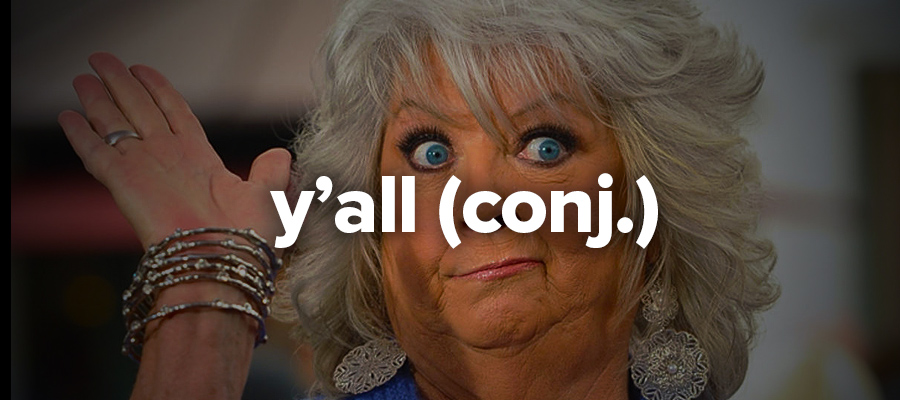
Y'all
We’re starting easy with this Myrtle Beach saying, as most folks know this to be short for you all or you. But what you may not know is that y’all can be used to address a single person, a few people, or an entire group of people. It’s versatile like that.
Example: Are y’all headed to the beach today? When y’all think you’ll be back?
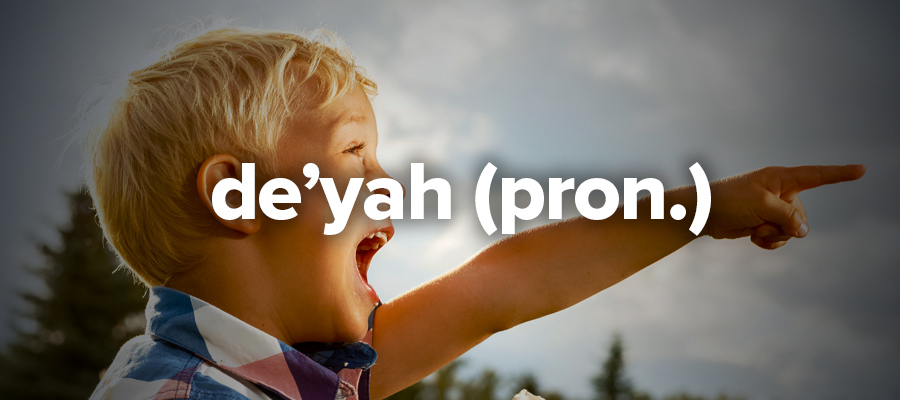
Dey'ah
This southern slang term means “there” and you’ll hear it swapped into many sentences while visiting Myrtle Beach.
Example: How y’all doin’ over dey’ah?
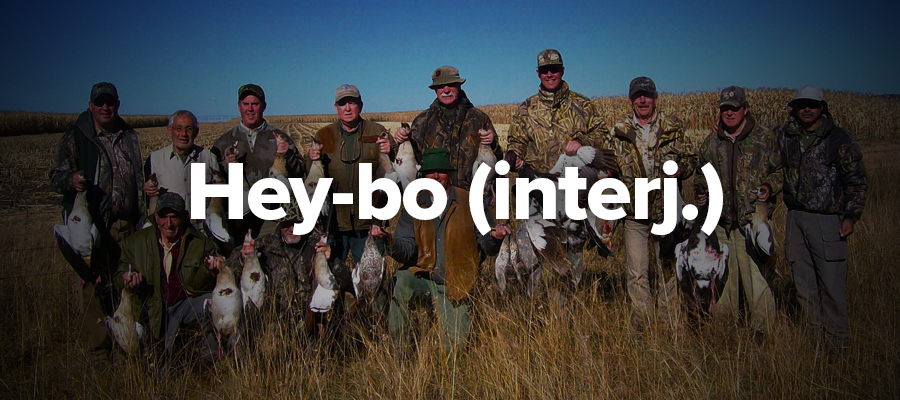
Hey-bo
This is a common greeting among hunters, fishermen, and all forms of South Carolina good ol’ boys. Stylized from the words “Hey, boy!” it is pronounced “AY-bo.” The saying has adorned many a ball cap and T-shirt, even sparking a South Carolina-based lifestyle line known as Heybo Outdoors.
Example: Hey-bo! What’s up, Cuh?

Fixin'
This is a prominent South Carolinian saying for when one is about to, preparing to, or planning to do something at a later time.
Example: I’m fixin’ to get me some shrimp and grits for breakfast.
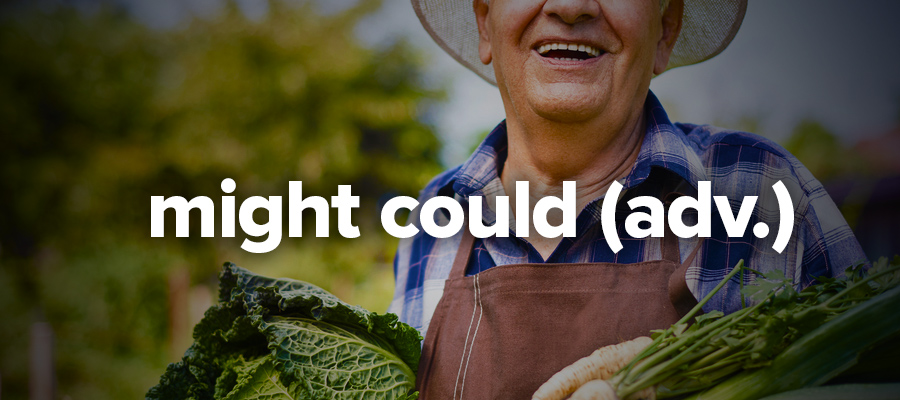
Might Could
You’ll hear this Myrtle Beach saying from time to time and its rough translation means “would perhaps be able to.” It is often used in relation to what one is fixin’ to do later.
Example: You fixin’ to head on down to the beach? Well, I might could go after work.
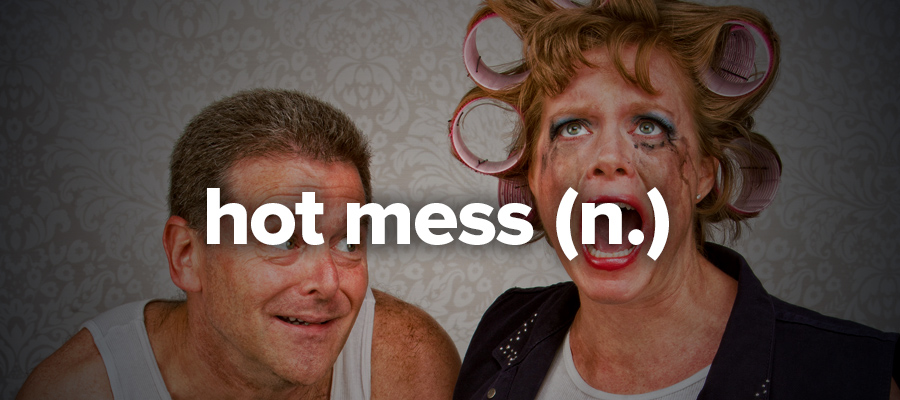
Hot mess
A person or situation that is completely out of control, beyond salvation, or disastrous, is known in Myrtle Beach as a “hot mess.” This generally derogatory term is often used to describe someone who seems to have it all together on the outside but is actually in a complete state of disarray on the inside. Often a hot mess is like a car accident—you know you should look away, but the level of utter chaos within draws your interest.
Example: That’s the fourth guy I’ve seen her out with this week. That girl’s a hot mess!
Nicknames for Myrtle Beach
To help you get the hang of Myrtle Beach nicknames, we’ve devised this tongue-in-cheek glossary—think of it as our own, less-vulgar version of Urban Dictionary—with a variety of useful, interesting, and even downright silly local terms and slang words you might hear during your vacation in Myrtle Beach.
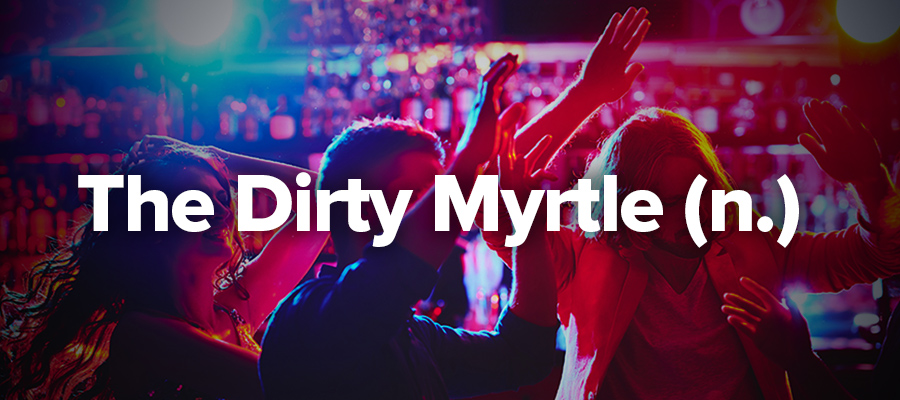
The Dirty Myrtle
In addition to beloved monikers like “The Golf Capital of the World,” “The Grand Strand,” and “The Redneck Riviera,” Myrtle Beach has picked up several not-so-friendly nicknames, including “Dirty Myrtle” and “The Dyrtle.” These nicknames refer to the less-desirable aspects of beach life. Though the predominance of family-friendly fun throughout the area means you can easily have a vacation without experiencing the more “adult” side of the Grand Strand, the allure of tourism dollars has also drawn plenty of vice-based entrepreneurs to town. Whether it’s the T-shirt shops selling clothing with crass sayings, head shops peddling ninja stars, or the seedy gentlemen’s clubs and after-hours bars, it’s best to avoid the Dirty Myrtle whenever possible.
Example: You guys ready to hit up The Dirty Myrtle tonight? Nah man, I’m still recovering from last time….
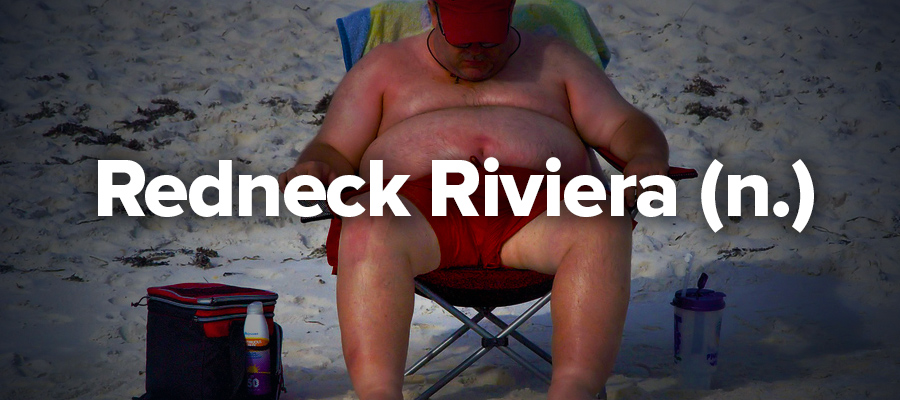
Redneck Riviera
Despite claims by the Emerald Coast/Florida Panhandle/Panama City area to this term, anyone who has visited the area knows this beloved nickname really belongs to Myrtle Beach. Don’t believe us? Take it straight from the mouth of country music star John Rich, who has a trademark on the term Redneck Riviera. “You know they call Myrtle Beach the Redneck Riviera. I’ve always thought that was one of the greatest phrases ever. … So I trademarked the phrase and created a whole lifestyle line,” he said recently in an interview.
Example: That guy was wearing flip-flops and socks with a Confederate flag tank top.… Only on the Redneck Riviera.
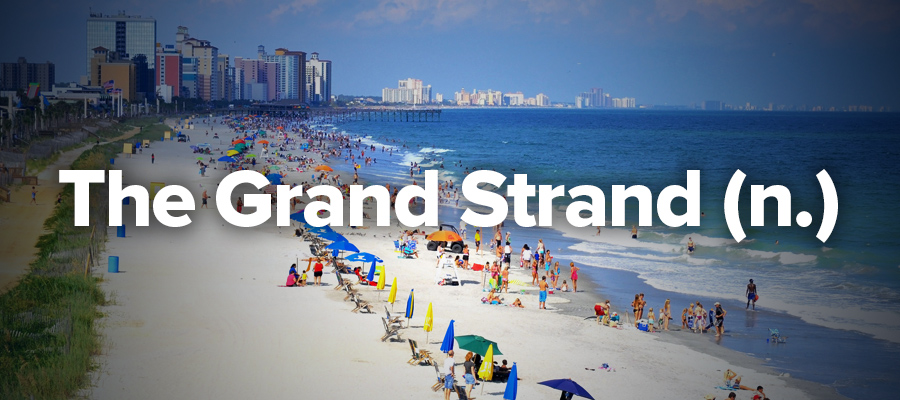
The Grand Strand
A roughly 60-mile stretch of sand—essentially an uninterrupted arc of beaches—that reaches from the North Carolina–South Carolina state lines near Little River, and then heads south to Georgetown, S.C., and to the Winyah Bay. The Grand Strand is the preferred nickname for the overall area that includes Myrtle Beach, North Myrtle Beach, Surfside Beach, Garden City, Murrells Inlet, and Pawleys Island. The term is credited to The Myrtle Beach Sun (now The Sun News) columnist Claude Dunnagan, who first used it as the title of a column in 1949.
Example: Man, you gotta love being on The Grand Strand!
Nicknames for Myrtle Beach Areas & Attractions
It seems every location you go in Myrtle Beach is called by at least one other name. Decoding the nicknames of popular places around the area helps you know what it means when your tour is taking you by The Golden Mile or to confirm with your rideshare you want to go to Bennett’s Calabash Seafood on Restaurant Row. Here are some of the nicknames for places in Myrtle Beach:
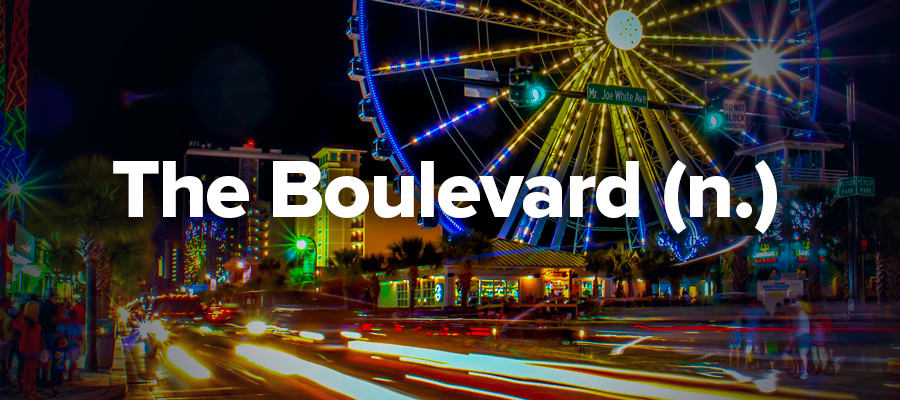
The Boulevard
Getting around Myrtle Beach successfully may require help from locals who ascribe nicknames to many of the streets in the area. The most famous road in Myrtle Beach is Ocean Boulevard, which has gone by “The Boulevard” for years, one of many roads around town nicknamed by the locals. Cruise this road for a taste of everything Myrtle Beach has to offer—and learn about Myrtle Beach traffic at the same time. Others you should know are The Bypass (a.k.a. U.S. 17 Bypass), The Back Gate (the intersection of U.S. 17 Bypass and Farrow Parkway near The Market Common), and The Forest (a.k.a. the Carolina Forest area of Myrtle Beach).
Example: Let’s hit the Boulevard and grab a bite to eat and then go cruisin’ for chicks!
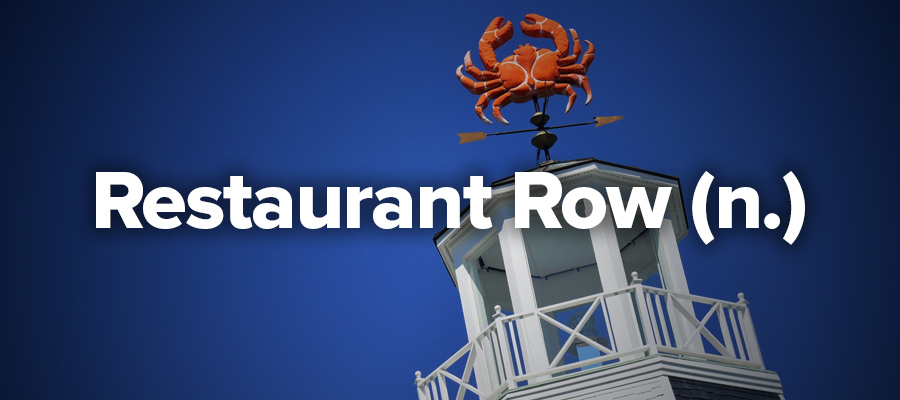
Restaurant Row
Restaurant Row is a nickname for the Myrtle Beach area known for its high density of places to eat. Situated in a sort of no man’s land between Myrtle Beach and North Myrtle Beach on a strip of U.S. 17, Restaurant Row features casual eateries and upscale dining to satisfy any appetite. This section is known for its buffets, too, including Benjamin’s Calabash Seafood, Giant Crab Seafood, Chuck’s Steak House, Bimini’s Oyster Bar, Rossi’s Italian, La Festa Ristorante Italiano, Thoroughbred’s Chophouse, and several others.
Example: OMG I’m so hungry. How hungry? Restaurant Row hungry.
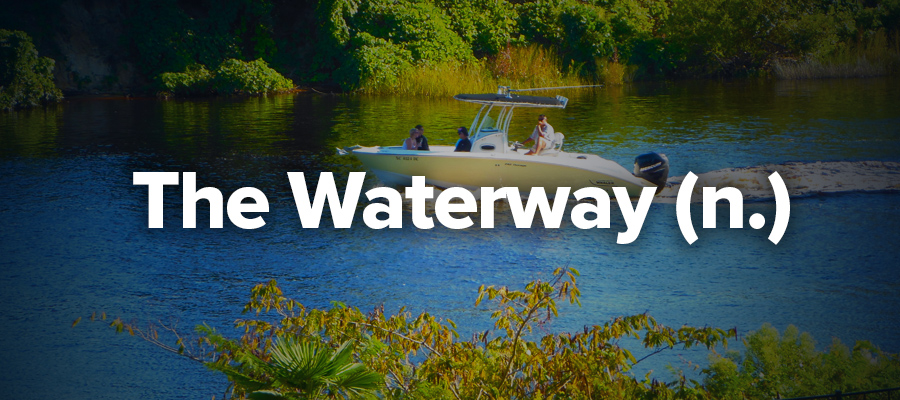
The Waterway
Known to most as The Atlantic Intracoastal Waterway, this is a 3,000-mile inland waterway that runs parallel to the coast of the Atlantic Ocean and to the Gulf of Mexico. Around here it’s often called the Inter-coastal or simply The Waterway. It empties into the Atlantic Ocean on the northern end of Little River and on the southern end of the Grand Strand into the Winyah Bay near Georgetown. In addition to offering a picturesque backdrop for luxurious homes and golf courses, The Waterway also offers an abundance of natural beauty and serves as a playground for watersports enthusiasts. On any given day, The Waterway hosts thrill-seekers enjoying top-notch watersports via speed boat, jet ski, or jet pack. It’s also a popular area to relax on a pontoon boat, take a kayak for a spin, or go on a romantic dinner cruise.
Example: You guys wanna hit The Waterway and cruise up to The Boathouse for Sunday Funday?
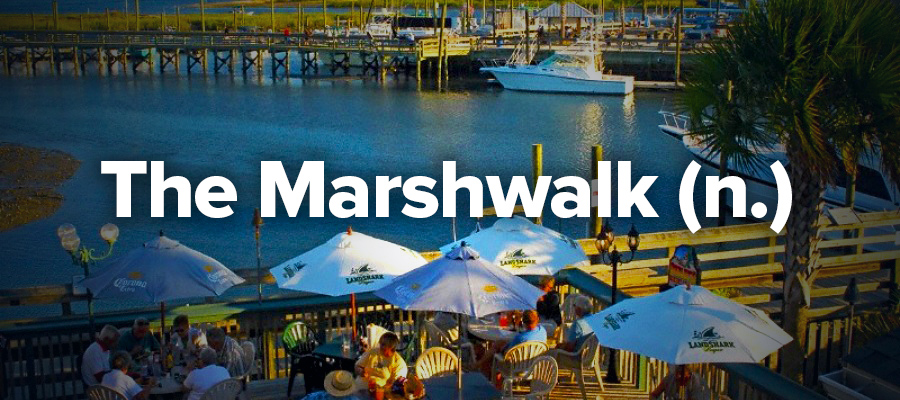
The Marshwalk
Just 15 miles south of Myrtle Beach is Murrells Inlet, a town with a ½-mile long promenade nicknamed the Murrells Inlet MarshWalk (or simply, The Marshwalk). Not to be confused with The Boardwalk in downtown Myrtle Beach, The Riverwalk in Conway, or the Georgetown Harborwalk, Murrells Inlet distinguishes itself as “The Seafood Capital of South Carolina,” and the dining and nightlife are some of the best in the area. With walkable paths paved partially with concrete and oyster shells and at other points a wooden boardwalk, the area is known for its waterfront views of the gorgeous saltwater-filled marsh. Popular restaurants here include Dead Dog Saloon, Bubba’s Love Shak, Creek Ratz, Drunken Jack’s, Captain Dave’s Dockside, Wahoo’s Fish House, and Wicked Tuna.
Example: I’m headed down to The Inlet for some drinks and dinner at The MarshWalk.
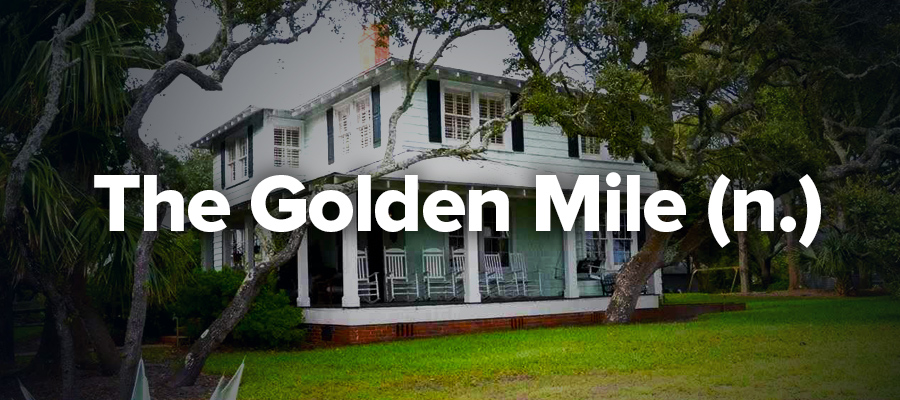
The Golden Mile
The area nicknamed The Golden Mile is a prestigious section of Myrtle Beach that runs from 31st Avenue North to 52nd Avenue North. This stretch of Ocean Boulevard is where you’ll find some of the most luxurious beachfront homes—some valued upwards of $4 to $5 million. While there are some hotels near the Golden Mile, it is a quieter area so you can park at one of the public access points here to enjoy less crowded stretches of the beach.
Example: Let’s hit the beach today up by The Golden Mile. Meet me at 48th.
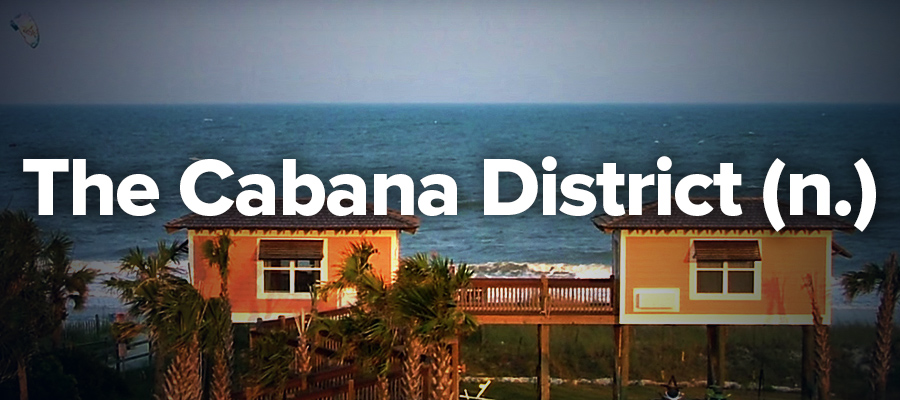
The Cabana District
The Cabana District is the area on the north side of Myrtle Beach and is highlighted by small, brightly colored oceanside shacks with unobstructed views of the beach. Running from the 5400 block to the 6000 block of Ocean Boulevard, The Cabana District is a nice, flat stretch of road with several beach access points, fitness stations, and a park/playground known as Gardens By The Sea. The history of the small, privately owned buildings that give the area its name is a bit of a mystery, with some locals claiming they were part of the Ocean Forest Resort—which stood in the area from 1930–1974—and others saying they originally belonged to homes that were knocked down long ago in favor of hotels and condos.
Example: I went walking up at The Cabana District today and then took the kids to the park.
Resort Phrases & Slang
Knowing these common resort terms used by hotels can make sure your reservation doesn’t get lost in translation. Recognizing the difference between a suite and a room, and ocean view versus oceanfront can make a big difference when booking a hotel in Myrtle Beach. Here are common terms and definitions for resorts and hotels in the area.
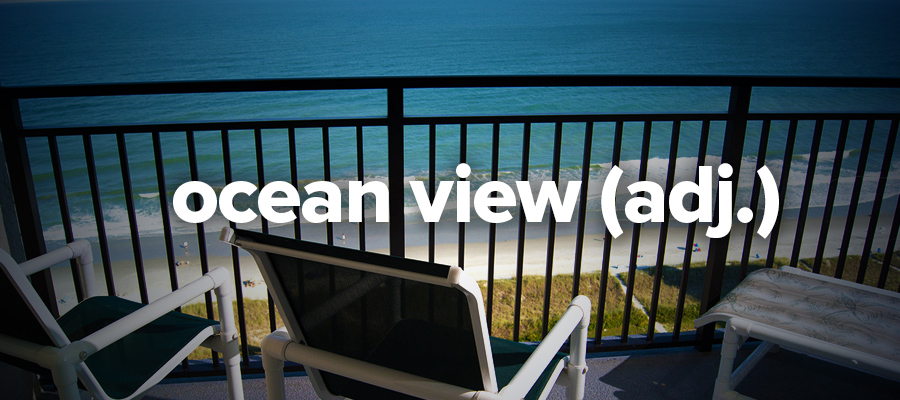
Ocean view
Ocean view is an important term to know when booking a Myrtle Beach hotel. An ocean-view room can include any accommodations with the slightest view of the water. This won’t mean the view is necessarily bad—sometimes ocean-view rooms offer perfectly gorgeous vistas—but they can also sometimes disappoint. If you think you found a deal on an oceanfront hotel, read the details carefully, because the partial water views are often less expensive. If you’re expecting an oceanfront room, which is one that faces the ocean and beach directly, you may find your ocean view room less impressive.
Example: I asked the lady, why not just book the ocean view room? You can still see the beach and might as well save a few bucks.
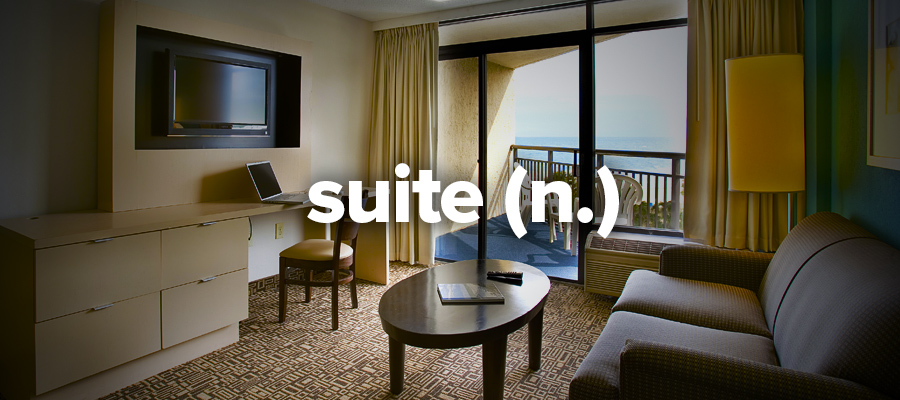
Suites
Though this word isn’t unique to Myrtle Beach, it is common to see the term slapped onto accommodations where it doesn’t belong. Compared to a standard hotel room (generally a single room with one or more beds and a bathroom), a hotel suite offers more space, with a larger living area that branches off into two or more bedrooms. Suites in Myrtle Beach often feature full kitchens, desk areas, balconies, laundry machines, and other amenities. If in doubt about what your room features are, always speak with hotel reservationists to learn more about what is included.
Example: I had the room all booked, but then my sister and her kids wanted to come, so I changed it to a suite.
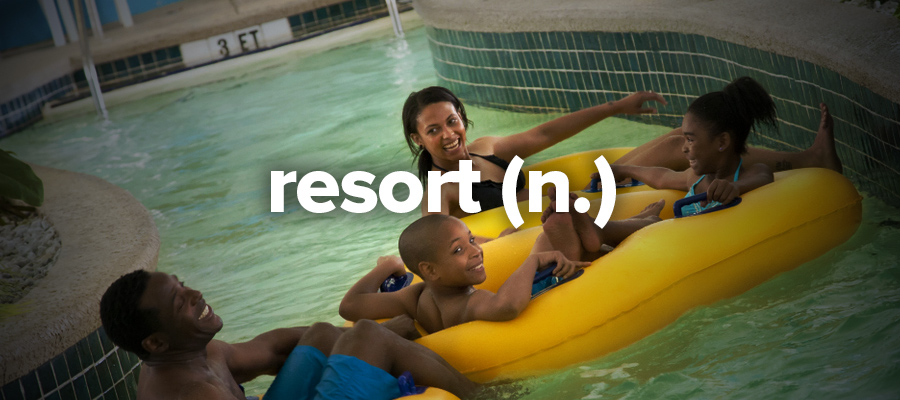
Resort
While many confuse the two, a hotel is an establishment that provides lodging, while a resort provides accommodations and an attraction—such as a beach—with a variety of additional entertaining amenities. You’ll find many Myrtle Beach hotels with lazy rivers, game rooms, and even playgrounds, that are, in fact, resorts masquerading as hotels, but checking the long list of offerings will clear up any confusion.
Example: I couldn’t believe our resort was so nice. The rooms were great, the food was good and the kids loved all the pools and waterslides.
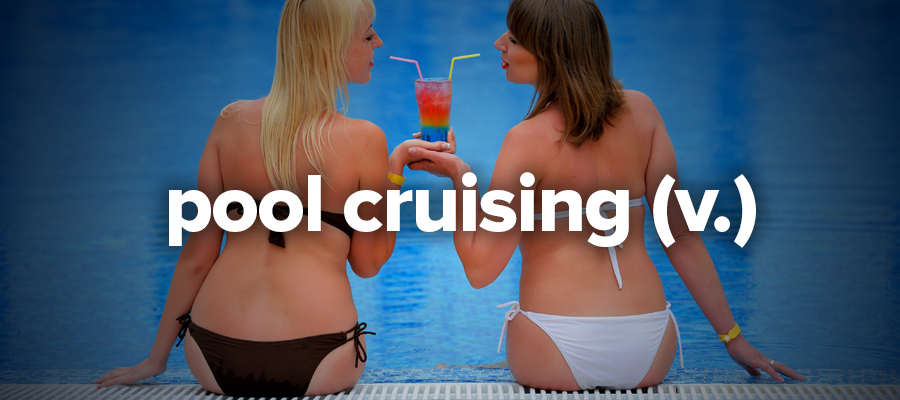
Pool Cruising
Pool cruising is slang for the local tradition of sneaking into various hotel pools in order to cool off and experience the tourist lifestyle or—more often than not—meet visitors for a summer fling. Though many resorts and hotels have added security measures and wristbands to combat this practice, it is still common to find locals and visitors enjoying a cruise here and there.
Example: Sandy and I went pool cruising the other night. You wouldn’t believe the cute guys we ran into!
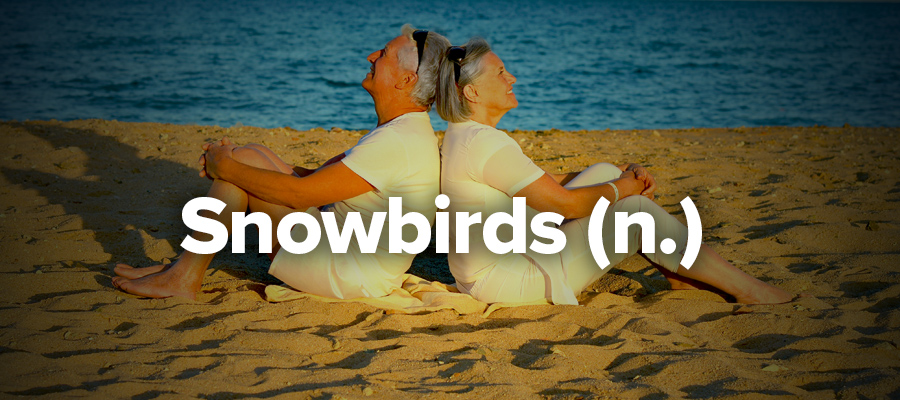
Snowbirds
This slang term refers to visitors who flee from freezing winter climates for warmer weather in Myrtle Beach and other Southern states. Many among this crowd are retirees hailing from Canada, New York, New Jersey, Pennsylvania, Ohio, and other Mid-Atlantic and Midwestern states. Some have second homes here or rent condos during the off-season and begin hitting the Grand Strand as the weather gets chilly, usually around the holidays. Throughout December, January, and February, you’ll often find these part-time residents packing buffets, shopping centers, and various attractions throughout the area.
Example: You guys wanna hit up the early-bird buffet for dinner with all the snowbirds? It’s all-you-can-eat for like $9.99. But dude, it’s only like 4:00.
Nicknames for Food in Myrtle Beach
While Myrtle Beach is known for fantastic, fresh seafood, there are other cuisines here worth checking out. Many foods here have nicknames you’ll want to know before digging in. If the Lowcountry boil or a Calabash-style buffet catches your eye, here’s what it all means:
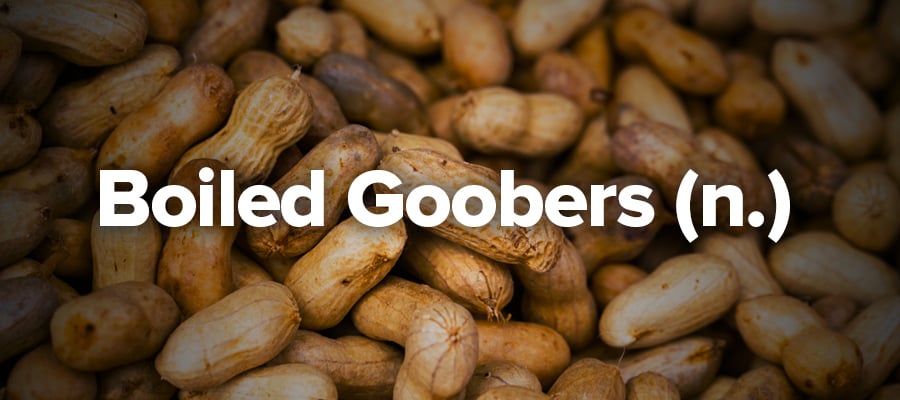
Boiled Goobers
The area’s favorite snacks are nicknamed boiled goobers and in some locales, goober peas. These slightly strange names for a boiled peanut snack make it one of the most misunderstood Carolinian delicacies. This Southern specialty originates from 19th-century African slaves and consists of slightly raw or semi-mature peanuts that have been boiled in salt water to soften them into something resembling a pea or bean. The nuts are occasionally boiled in ways to infuse them with flavorings from ham hocks, hot sauce, Old Bay seasoning, or beer, but expect a strong salty taste however they’re prepared. In 2006, Gov. Mark Sanford signed a bill making boiled peanuts the official snack of South Carolina.
Example: I downed a ton of boiled goobers today and washed them down with like a gallon of Cheerwine.
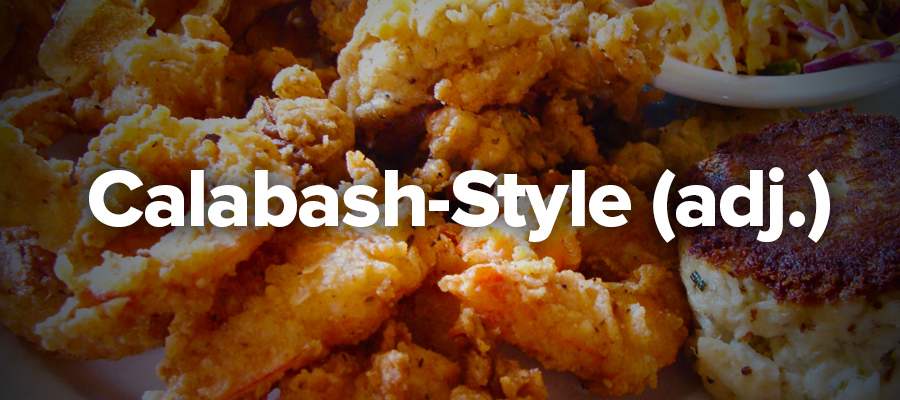
Calabash-Style
This distinctive style of fried seafood was nicknamed by the restaurants in the Calabash, North Carolina area where it became popular. Food prepared Calabash-style features cornmeal used as the base for its batter instead of flour. This frying technique was invented by a pair of families—the Becks and the Colemans—who ran fish camps in the area in the 1930s and later opened restaurants in the 1940s. Over the decades this style has expanded beyond the borders of Calabash and is served in restaurants and buffets across the Grand Strand. You’ll find several places that incorporate the nickname into their restaurant title, including The Original Benjamin’s Calabash Seafood, Crabby Mike’s Calabash Seafood, and Bennett’s Calabash Seafood.
Example: I don’t care what kind of fish that is. As long as it’s Calabash-style, I’m eating it!
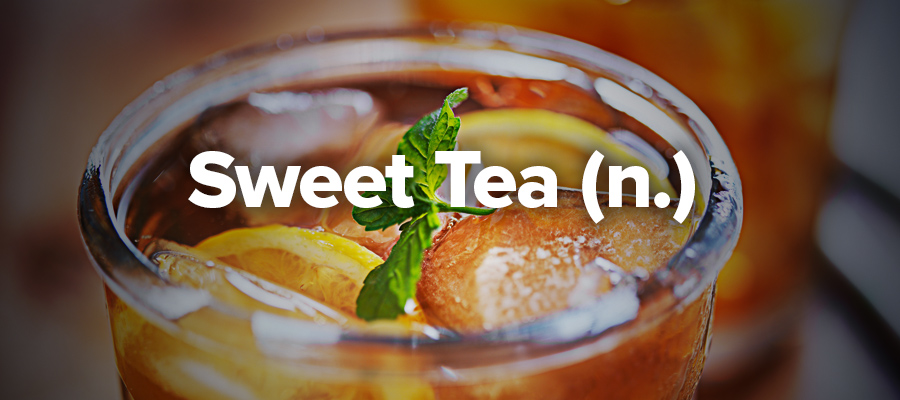
Sweet Tea
Sweet tea, a shortened name for sweetened iced tea, is the only acceptable tea beverage in Myrtle Beach. Though you will find many Myrtle Beach restaurants do offer an unsweetened version for Yankees, no self-respecting local would be caught drinking this pale and bitter imitation of real tea. As proof of how seriously Southerners take their allegiance to the sugary substance, a 2003 bill in Georgia suggested making it a misdemeanor when restaurants serving iced tea do not offer sweet tea as well as unsweetened.
Example: Do you want sweet or unsweet, hun? Wait, excuse me … did you say ‘unsweet’ tea? That’s disgusting.
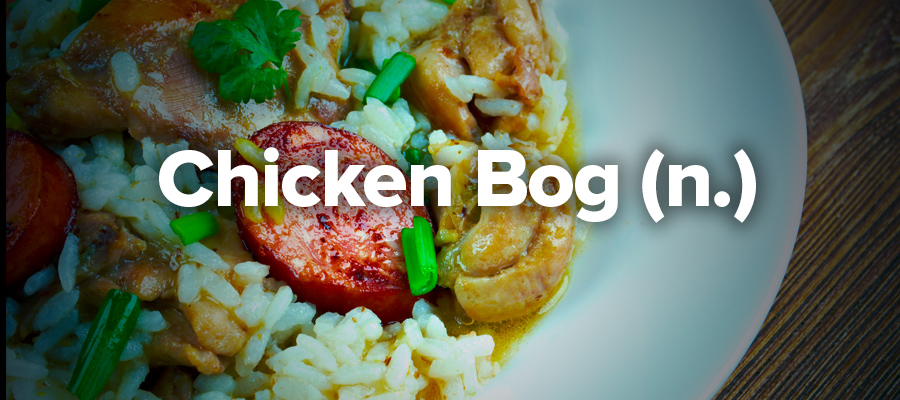
Chicken Bog
This nickname refers to a traditional South Carolinian food, specific to Horry County and its surrounding areas. Chicken Bog consists of rice, smoked sausage, chicken, and spices, similar to other rice dishes like Chicken pilau, pilaf, or perlo. The term “bog” refers to the sticky wetness of the dish and also to the bogginess of the region where it’s made. You’ll find variations of the dish which include peppers, onions, or other vegetables, but purists will tell you that the core ingredients should be enough. The Chicken Bog capital of the world is in nearby Loris, S.C., in the heart of Horry County. This town off of S.C. Route 9 has been hosting the annual Loris Bog-Off Festival each fall since 1979, but there are several Myrtle Beach restaurants serving Chicken Bog too.
Example: My momma makes the best chicken bog. I’m fixin’ to go get me some right now.
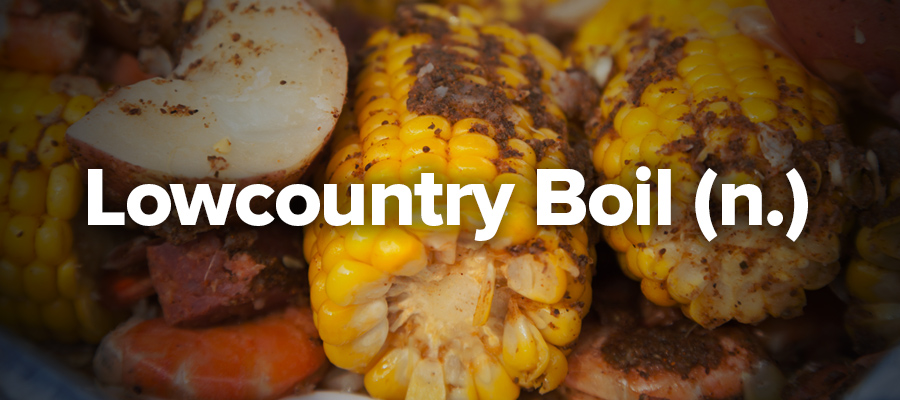
Lowcountry Boil
Other nicknames in South Carolina for this Myrtle Beach delicacy are Frogmore Stew or Beaufort Stew. A Lowcountry Boil is a one-pot wonder of fresh foods, born from the Creole-like cooking and traditions of the native Gullah culture. Though many variations exist, traditional ingredients include locally caught shrimp and/or crab, potatoes, sweet corn, smoked sausage, onions, and generous helpings of Old Bay seasoning. Unlike many stews, once cooked, a Lowcountry boil’s ingredients are drained from their cooking liquid and transferred to a platter (or sometimes just spread out on a newspaper-covered picnic table), and eaten without utensils. Many of the top seafood restaurants in Myrtle Beach have a variation of a Lowcountry Boil on their menu.
Example: Won’t y’all stop by for the Clemson game on Saturday? We’ll be throwin’ back some beers and having a Lowcountry boil.
South Carolina Slang
These slang terms and nicknames have reach all over South Carolina and you’re bound to hear them if you travel to cities near Myrtle Beach. There are several slang terms for things you might encounter on your visit and monikers for places you might go. Follow along to learn what pluff mud and palmetto bugs really are, and where to find Chucktown on a map.
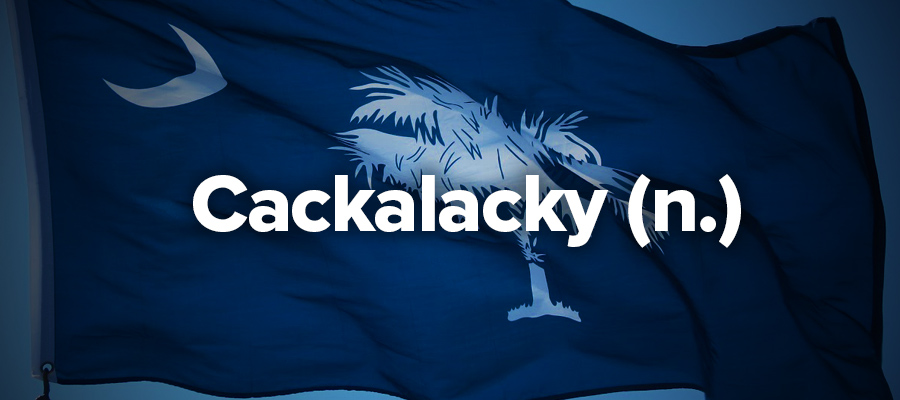
Cackalacky
This local parlance is used interchangeably with the word Carolina, referring most commonly—but not limited to—the states of South Cackalacky and North Cackalacky. Some would claim this nickname is reserved only for those residing north of the N.C.–S.C. state lines, but those people would be incorrect.
Example: Let’s all jump in the truck an’ head on down to South Cackalacky for the weekend!
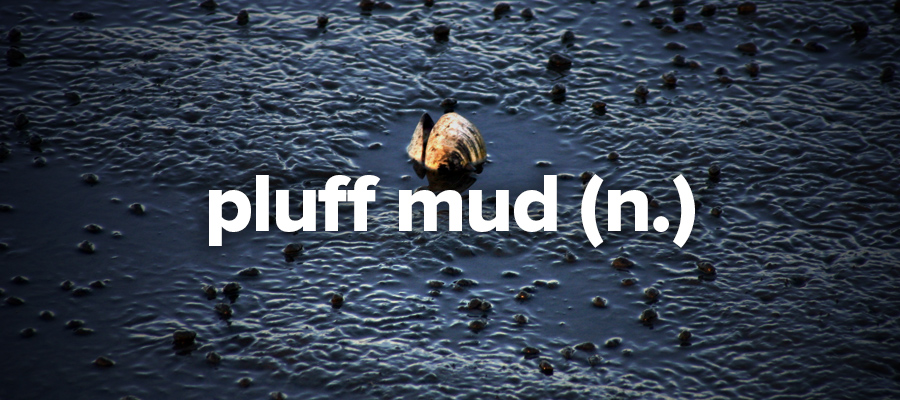
Pluff mud
This slippery, shiny brown-gray, sucky mud is found in tidal flats and spartina grass salt marshes, such as the areas near Murrells Inlet and Pawleys Island. This mixture of dirt, water, and animal byproduct indigenous to S.C. Lowcountry has a distinct and pungent odor that’s endearing to locals, but off-putting to many visitors and Northerners. Pluff Mud is known for its unpredictable sucking power, and when you step in it, you never know if you’ll sink up to your ankles, up to your knees, or to your hips.
Example: I went crabbing on Sunday and next thing I know I was waist deep in Pluff Mud. Lost both my shoes!
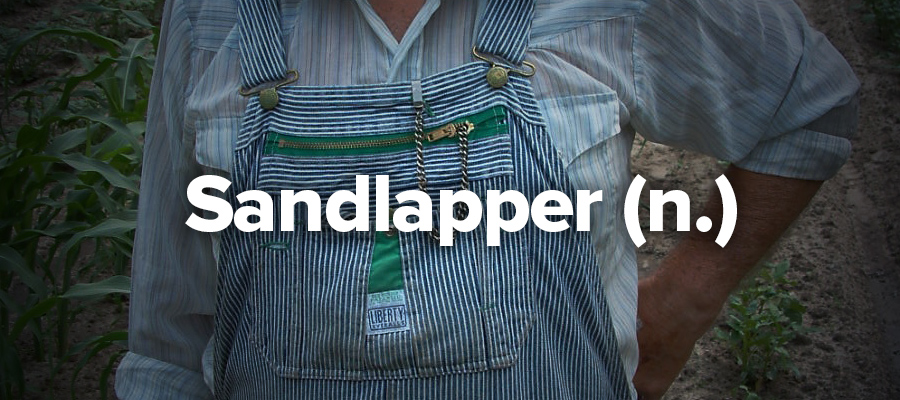
Sandlapper
Also known as Clay-eater or Dirt-eater, this term now often refers to a farmer or a poor, rural, countrified person from backwoods South Carolina, North Carolina, or Georgia. This term likely originated from people who historically ate dirt and clay to supplement an otherwise meager diet or as part of a cultural tradition.
Example: Y’all seen Skeeter lately? Nah man, I ain’t see that ol’ Sandlapper nowhere….
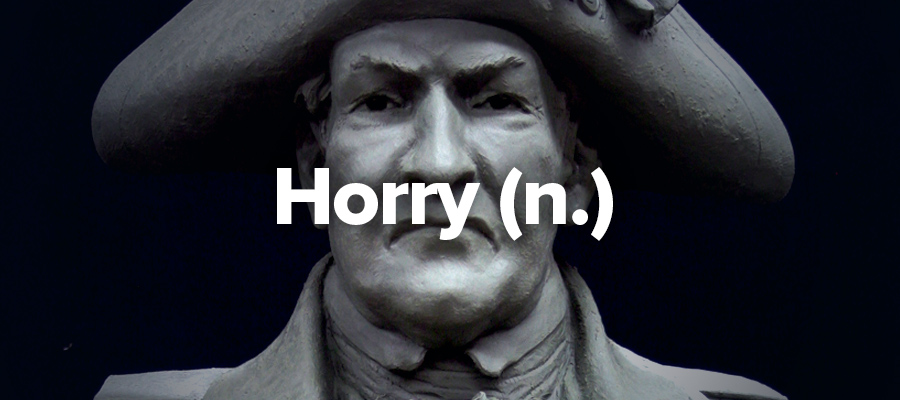
Horry
This is the name of the county in which Myrtle Beach resides, named for Revolutionary War hero Peter Horry, who served under the famed Brigadier General Francis “Swamp Fox” Marion. For those who want to sound like a true local, the word is pronounced Oh-REE, but more often than not, folks say O-ree, like former NBA star Robert Horry. Just make sure you avoid the hard “H” sound and don’t say it like “Whore-ee” or you’re sure to get some funny looks.
Example: You better take down that beach tent, or Horry County Sheriff will write you a ticket.”
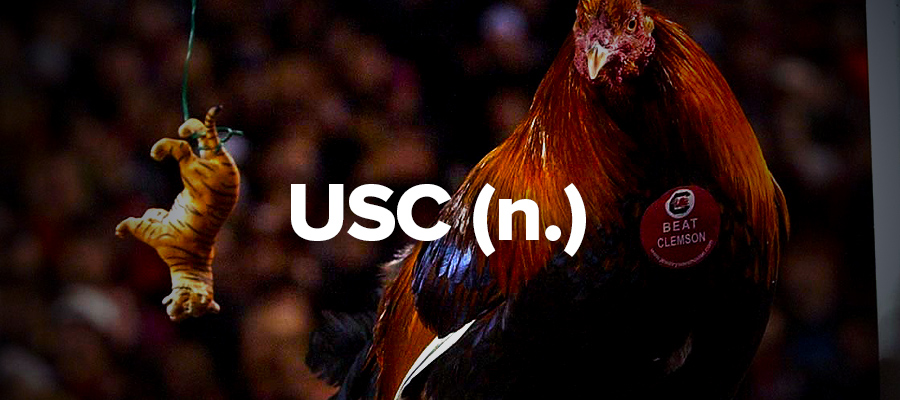
USC
This is short for The University of South Carolina, known to many as simply SC or Carolina, not to be confused with the University of Southern California—which is nicknamed Southern Cal or The Other USC. The school is just over two hours west of Myrtle Beach in Columbia, S.C., and its Gamecocks sports teams are one of only three acceptable choices to cheer for in the area (the others being the Clemson Tigers and Coastal Carolina Chanticleers). While locals may claim to understand that other college teams exist, they generally are not aware that there is a world outside of the SEC (during football season) and ACC (during basketball season). And certainly do not expect them to change the channel to put on a Big 10 or Pac-12 game.
Example: Dang man, old ball coach looks like he got him a pretty solid squad up at USC this season!
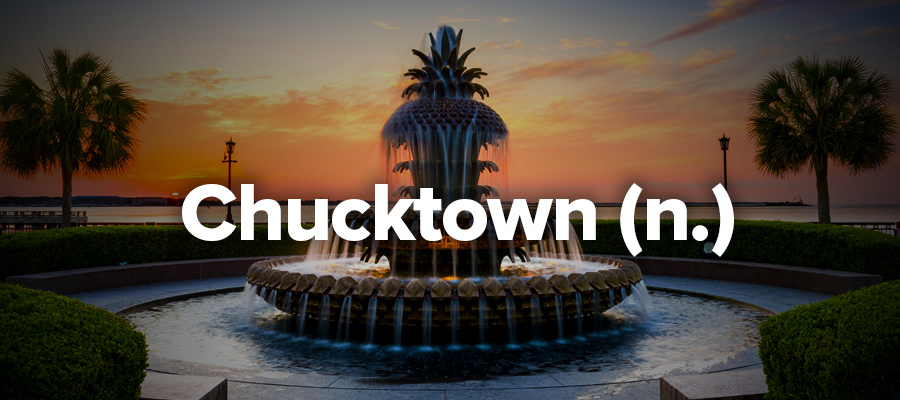
Chucktown
The most common way beach dwellers like us refer to Charleston, S.C., Chucktown is our closest neighbor to the south. Though some residents of this highfalutin vacation destination would like you to refer to it as “The Holy City,” we think our good ol’ Redneck Riviera nickname of Chucktown is better. Taking a day trip to Charleston, also known as The Chuck, is a perfectly good way to indulge in boutique shopping for seersucker suits, enjoy tea with some uppity Southern belles, or grab a gluten-free craft brew with some hipsters.
Example: Who wants to head down to Chucktown with me? I’m gonna buy some bowties, get me some shrimp and grits, and have my handlebar mustache waxed!
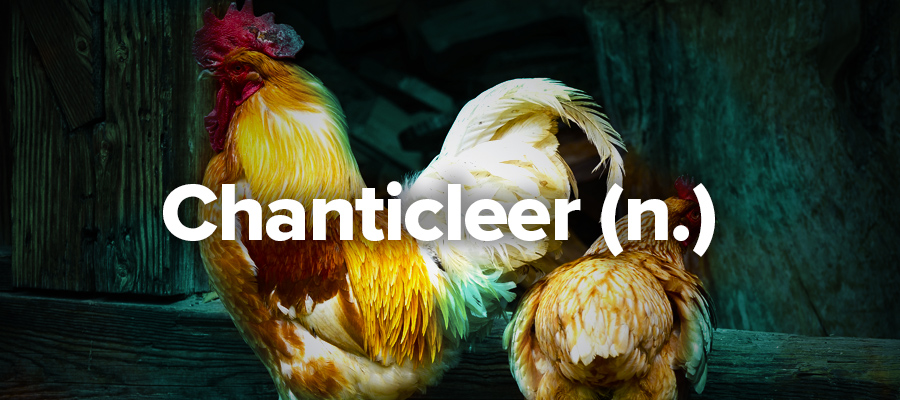
Chanticleer
This nickname was derived from Chaucer’s Canterbury Tales, specifically the Nun’s Priest Tale, which features a fierce rooster who dominates the barnyard. Chanticleer is lovingly known locally as the mascot for Coastal Carolina University, a public university just west of Myrtle Beach in Conway, S.C. Since 1993, when the school broke free from the University of South Carolina, its sports teams have been known as the Chanticleers. You’ll hear them called “Chants” for short, which is pronounced with a soft ‘ah’ sound as in JAW, and not a hard, short-A sound as in CHANT.
Example: Y’all seen the new field at Coastal this year? The turf is bright teal with a huge Chanticleer logo in the center.
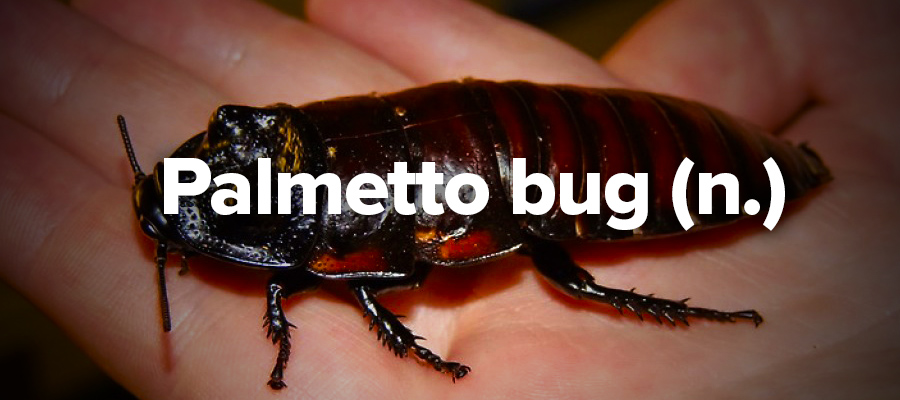
Palmetto Bug
Despite South Carolinians’ best efforts to make them sound cute, “palmetto bug” really refers to a big, ugly cockroach. According to Orkin.com, the term is a general name commonly used to refer to several species of cockroaches in the southern U.S. including the Florida Woods Cockroach. Palmetto bugs can measure up to 2 inches long, and when alarmed, they can eject an extremely foul-smelling directional spray up to one meter. So needless to say, avoid these little guys at all costs.
Example: That room looked clean, but I found a big, nasty palmetto bug under the bed. Gross!
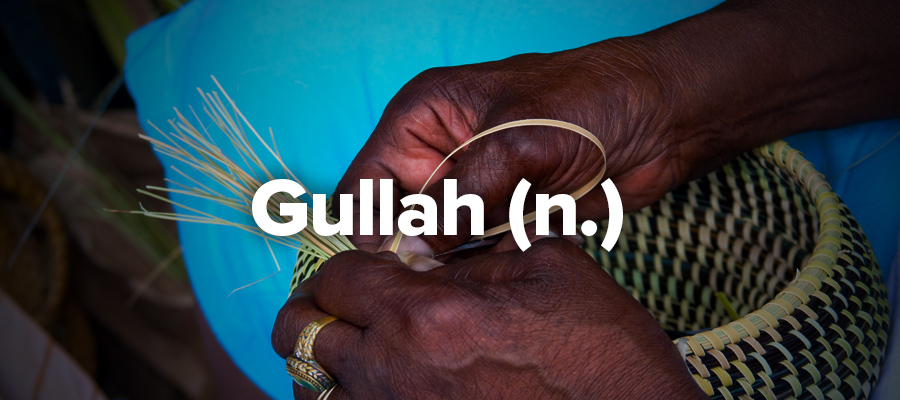
Gullah
The Gullah are people of African descent whose ancestors were brought over from Sierra Leone, Senegal, Gambia, and Liberia. The term refers both to the people—called “Geechees” within the community—and the language they speak. Residing mostly in South Carolina and Georgia, this culture has been a part of the history of the Grand Strand and the area extending south into the Lowcountry for centuries. The language, also called Sea Island Creole English, combines African words and sentence structure with the English language. It was created by slaves who were required to learn English by their masters. You can learn more about the history of the Gullah at attractions such as Brookgreen Gardens.
Example: I’ve gotta get me one of those sweetgrass baskets them Gullah ladies is selling by the side of the road.
Party-Related Nicknames & Terms in Myrtle Beach
Whether you’re visiting Myrtle Beach to party or not, knowing these nicknames for party places and traditions can help you find—or avoid—a rowdy scene. Be aware of the different definitions for shag (as in, dancing) versus other types, and what a patio party might actually mean before agreeing to things when you’re Myrtle Beach drunk. Here are a few must-know party nicknames you’ll hear in Myrtle Beach:
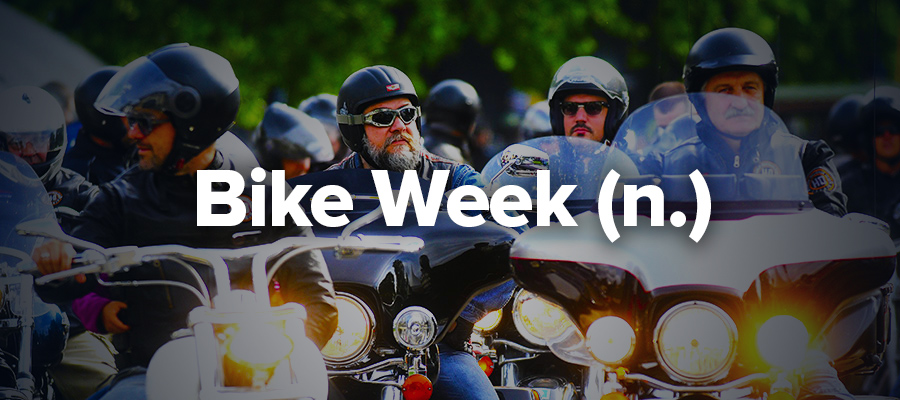
Bike Week
For many years, Myrtle Beach Bike Week (aka Bike Month) has been one of the most popular and well-attended events in the Grand Strand. There are two large gatherings of motorcycle enthusiasts each May: Spring Harley Week and Atlantic Beach Bike Week. You will also occasionally hear the term “bike week” or “bike rally” used in the fall, but the events held later in the year draw only a fraction of the crowds that come for the spring rallies.
Example: Bike Week here we come! Time to hit up The Beaver Bar and party at Suck Bang Blow.
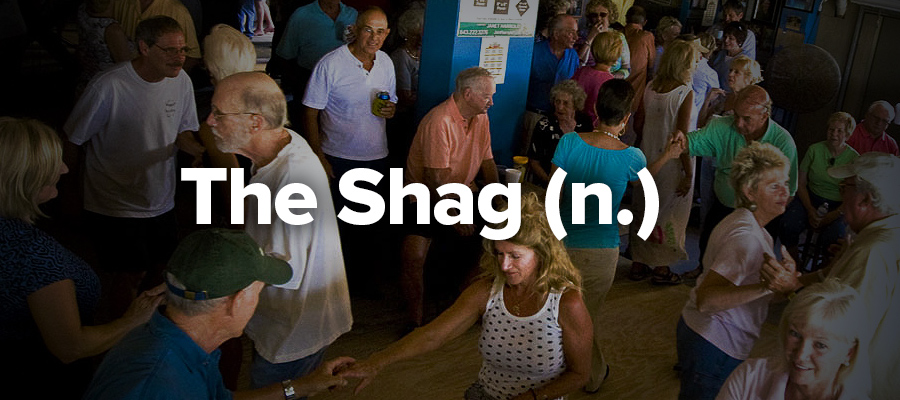
The Shag
The Carolina Shag—known to most as simply The Shag—is the official state dance of South Carolina. Originating in the 1940s along the beaches of Myrtle Beach, North Myrtle Beach, and Wilmington, N.C., the dance is a descendant of the Carolina Jitterbug and its predecessor, the Little Apple. This popular partner dance is a six-count, eight-step pattern similar to a six-count Swing that has been danced in the beach clubs (often referred to as shag clubs) along the Grand Strand for decades. The National Shag Dance Championships started in Myrtle Beach in 1984. The SOS Spring Safari still happens to this day and attracts dancers from all over the world. The act of doing The Shag is known as shagging, and is not to be confused with the British connotation of the term popularized by Austin Powers.
Example: Excuse me, would you like to dance? Of course, but only if it’s The Shag, my dear!
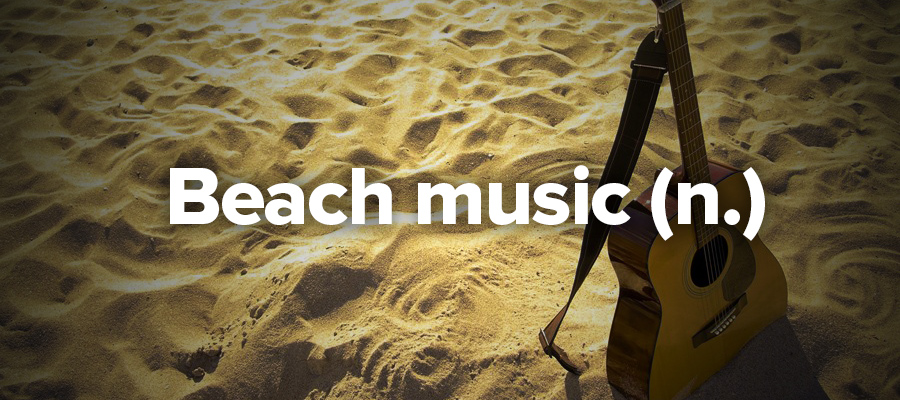
Beach Music
Carolina Beach Music, often shortened to “Beach Music” or sometimes “Beach Pop” is a regional genre from the 1950s and 60s that combines Rock ‘N’ Roll, Rhythm & Blues, and Pop. Supporters of the Shag have created their own culture centered on Beach Music, closely associated with the dance. Take a quick visit to North Myrtle Beach’s Main Street and you’ll find several famous clubs, including Fat Harold’s Beach Club, Duck’s Beach Club, and OD Arcade & Lounge, with DJs and live bands playing Beach Music, and hosting Shag dancing events throughout the year.
Example: I sure do love some Beach music! There’s nothing like shagging the night away to the sounds of a great live band!
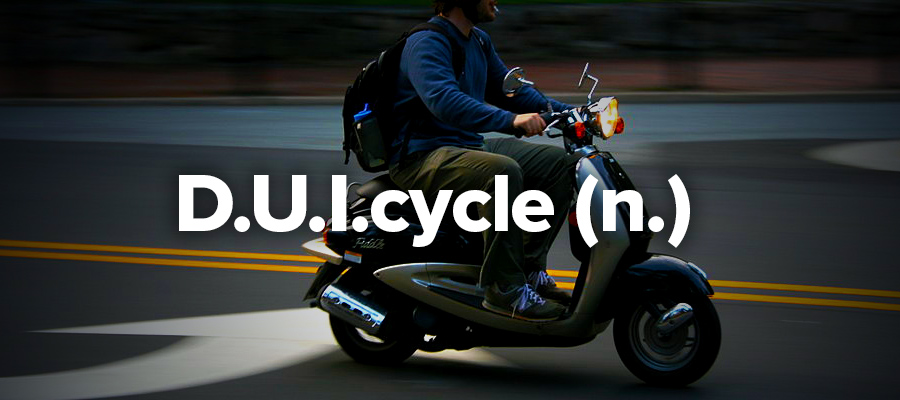
D.U.I.cycle
The D.U.I.cycle nickname for scooters or mopeds is derived from the fact that in South Carolina mopeds and scooters do not require a driver’s license to operate and many people convicted of driving under the influence use them as a means to get around. For many years, a loophole in S.C. law meant you could not be arrested for a DUI while driving a moped (an ordinance that has since been changed). While these vehicles are a perfectly acceptable form of fun for tourists to zip around town or cruise the Boulevard, when you hear someone say D.U.I.Cycle, they are referring to a local’s mode of transport due to a lost license.
Example: I gotta go pick up Steve so he doesn’t have to ride his D.U.I.cycle to the bar again.

Patio Party
This is the Myrtle Beach nickname for a large party traditionally thrown by locals who sneak onto the premises of vacant beach houses. This much-heralded practice was more common in the 1970s and ’80s when throwing a keg party at a stranger’s house was more of a “kids will be kids” rite of passage than the breaking-and-entering felony it is today, but legend has it that patio parties still happen from time to time.
Example: I’m headed out now to meet Ashley and then we’re going to this patio party with the guys we met at the beach earlier.
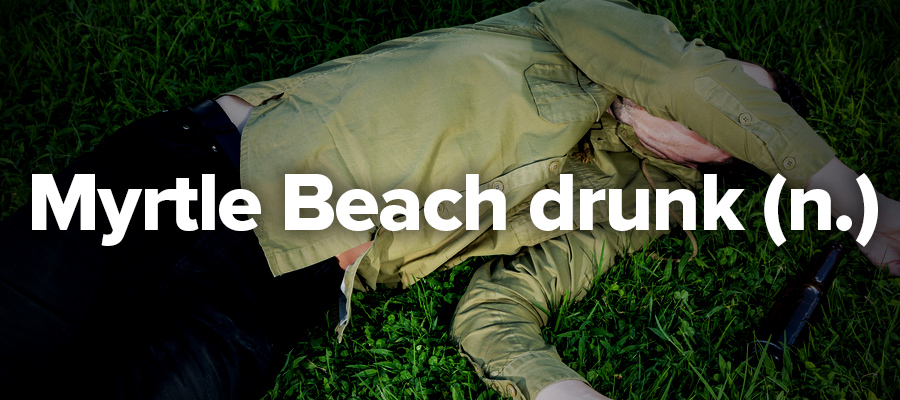
Myrtle Beach Drunk
According to Danny McBride’s movie The Foot Fist Way, the term Myrtle Beach Drunk refers to the most intoxicated a person can possibly be. It’s also referenced by McBride’s infamous degenerate minor league pitcher, Kenny Powers, during season three of HBO’s Eastbound & Down, which was partially filmed in Myrtle Beach. According to Urban Dictionary, the term means “launching one’s self into an absolute drunken stupor ending with great stories of bad decisions.”
Example: It’s payday and I’m getting drunk tonight, boy! I’m talkin’ Myrtle Beach drunk!
Now that you know how to speak like a local, it’s time to book your visit to the Grand Strand! There are always things to do in the Redneck Riviera, and the oceanfront resorts provide all the entertainment you need so you won’t have to worry about finding a patio party or pool cruising.
About The Author
Isabella grew up in Chicago, Illinois. She is a Coastal Carolina University graduate, and after working in 6 states, she now permanently resides in Myrtle Beach. She is an avid reader, enjoys photography in her spare time, and frequents the beautiful Grand Strand beaches as often as possible.
